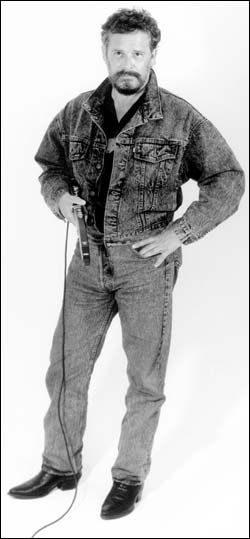Village Voice - Week of April 4-10,
2001
Shades of Pretty
by Kyle Gann
One night many years ago, following a certain number of
judgment-impairing
libations, I and a friend of mineÑwho will probably be relieved
to remain nameless in this connectionÑnoted between ourselves
that
all the major minimalist composers were heterosexual.
From this rather unfruitful-seeming coincidence we evolved a theory
of the sexual origin of aesthetics, our initial distinction being
between
the kind of music men write to intimidate other men (Charles Wuorinen
being
our textbook example), versus the kind of music men write to attract
women.
Whatever the merits of this dubious line of speculation (and believe
me,
you won't see any learned articles issuing from my computer on the
subject),
it has always struck me that, when it comes to attempts at musical
seduction,
Daniel
Lentz's music is way out in front.
West Coaster Lentz writes pretty, pretty music, but of so many kinds
that you find you never realize how many shades of pretty there are:
comfy
pretty, orgasmic pretty, weird pretty, disturbing pretty, aggressive
pretty,
chaotic pretty. Having followed and been seduced by his music myself
for
almost 20 years now, I realize with some shock that I've never before
had
an opportunity to devote a column to himÑthough highly regarded
in some circles, he is little performed in New York. But now he's
started
his own CD label, Aoede, and
suddenly seven CDs of his music have appeared in recent months, with
another
due in June. John Cage once said that the key to a composer's success
is
longevity, but self-sufficiency is equally essential, and digital
technology
keeps granting it to one person after another.
So now after a long dry spell we have a slew of Lentz's works to
assimilate.
The discs bring back into print some of the music from his early
minimalist
period on the Cold Blue and Icon vinyl labels, notably "Point
Conception,"
a rollicking process piece for nine overdubbed pianos in which his
characteristic
chord changes are already evident. He's reissued (on a disc called Wild
Turkeys) "The Crack in the Bell," a musing on e.e. cummings whose
jaunty
bouncing chords should have made it one of the most popular pieces in
the
entire American large-ensemble repertoire; and his even more astounding
wolfMASS, an actual liturgical mass in the form of a
stream-of-consciousness
collage, weaving together 14th-century music by Guillaume de Machaut
with
"Yankee Doodle" and "When Johnny Comes Marching Home."
But if you want to be shocked and stirred by Lentz's latest music
all
at once, get the Voices disc, with its pretty string chords that sound
calm and almost Muzak-y until they begin to glissando ominously. And
when
the bluesy voice of Ellis Hall, sometimes leaping into falsetto,
emerges
above the synthesizers, sounding as out of place as a halibut on a
pastry
cart, you at first think it's one of the occasional lapses into bad
taste
of which Lentz is capable. Inure yourself, though, and it melts into
yet
another of his unsettling brands of prettiness. Less jarring is "Temple
of Lament" on the same disc, in which Megumi Hashiramoto's ethereal
voice
floats above writhing but transcendently calm harmonies, like an
ecstatic
diva in a slow-motion opera performed underwater.
Tied as my other favorite in this Lentzian cornucopia is his ambient
disc huit ou neuf pièces dorées à point. This is
music
written to be played during dinner, each cut actually inspired by a
specific
meal he had in Paris in 1998. The curmudgeonly will call it New Age,
but
even in Lentz's most languid slow piano and harp arpeggios, in his most
aimless wordless vocal melodies dotted with chimes, you end up asking,
Where did he get that weird chord progression? How did he string the
melody
into new territory after his material had seemed exhausted? How did he
get that bitonal dissonance, that unexpected rhythmic change, to work
in
this mellow, inertia-laden context?
Lentz wrote years ago that his music had more to do with becoming
than
with being, and these new discs extend that thought. Unlike New Age
music's
predictability, every note seems freshly composed, every chord seems to
wipe the slate clean and offer a possibility of endless new direction.
Postminimalist he may be, but radical stream of consciousness is his
game.
The sudden doubling of the available Lentz disc catalog may finally
drive
that fact home.
Tell us what you think. editor@villagevoice.com

Web Statement.
I believe that music should be beautiful.
Or, at the very least, that
musicians should strive to make beautiful music.
Music doesn't have to
be pretty to be beautiful.
And, of course, there is alot of pretty music
that is far from beauty.
The 20th century was unique in that composers and other artists had,
for the first time, a comprehensive overview of music and art from many
centuries before. In the early 20th century European composers began
breaking
away from 19th century Romanticism (e.g., Debussy - Wagner). About a
quarter
century later some began to make bridges to the music of the 17th and
18th
century (Prokofiev, Stravinsky), and by the second half of the century
a number of composers were incorporating Medieval musical models into
their
work. Others attached themselves to musics from non-European cultures
and
fused these into their own languages. Perhaps the 21st century musician
will create connections to our "prehistoric" past and to cultures even
farther afield from those of our grounded planet.
HOME
Special Offers
for
your consideration
Resume
